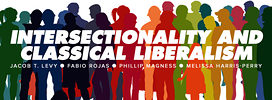From the Editor
We regret to inform readers that for personal reasons, Melissa Harris-Perry will not be participating.
Lead Essay
Jacob T. Levy describes intersectionality as “the analytical strategy of thinking about such phenomena as race and gender, or racism and sexism, as interacting.” As such, he suggests that this approach is a promising one, and he defends it against some common criticisms. Those who view oppression of all kinds as a primarily state-mediated phenomenon should want to add it to their repertoire of useful ideas, he argues.
Response Essays
Phillip W. Magness warns that intersectionality theory amounts to little more than a qualitative approach to multivariate regression analysis—and a doubtful set of ideological commitments. For centuries, those now known as classical liberals fought against slavery and other forms of discrimination, and their successors today don’t need any such new and dubious theories to continue the struggle.
Fabio Rojas expresses ambivalence about intersectionality’s relationship to classical liberalism. On the one hand, there is a clear line of influence running from Marxism and critical theory to intersectionality’s key proponents and texts, and this influence brings with it hostility toward the market process. But on the other hand, he finds that intersectionality can offer new insights into how states perform oppression, and how marginalized voices can learn to speak back. There is no marriage here, but there should be a dialogue, he concludes.

